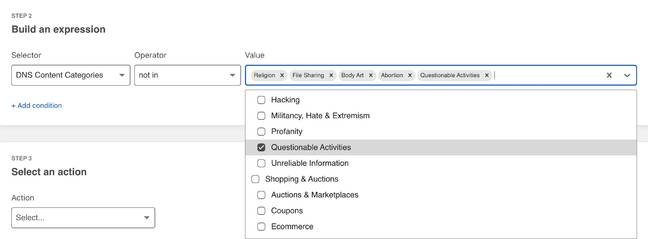This article is more than 1 year old
Cloudflare stops offering to block LGBTQ webpages
Like, you wouldn't filter out pages by Black people, right?
Cloudflare's internet filter service Gateway will no longer offer to block LGBTQ content, with the biz saying it was all an accident caused by one or more third-party suppliers.
It kicked off when Henry Cole, a UK-based IT analyst, challenged Cloudflare on Twitter. He said that when he was configuring a DNS policy for Gateway to block websites by content type, one of the "Society & Lifestyle" categories that could be filtered out was LGBTQ. Gateway can be set up by organizations to monitor and control their users' traffic, so that malicious content is blocked, problematic uploads are stopped, and so on.
"Swap LGBTQ for Black or any other protected characteristic, and you can see that this really doesn't look great on you," he wrote.
Cloudflare quickly agreed. SVP Dane Knecht thanked Cole and said, "That shouldn’t have been the case. We’re removing [it] now. I will update the thread once it has been rolled out."
Knecht blamed third-party vendors for the snafu. "We don't categorize sites internally," he said. "We purchase categorization from several external sources."
Cloudflare did not respond to a request for comment, and no thread update has yet to be posted, but "LGBTQ" is no longer available as a Gateway DNS Content Category setting.
Nonetheless, current menu options might still be worth reviewing. Providing customers with the ability to block access to information about "Abortion" or "Religion," for example, seems controversial, particularly from a company that has championed free speech and tried to avoid content policing.
In a phone interview, Alexis Hancock, director of engineering with the EFF's CertBot project, told The Register that while this incident was dealt with quickly, it's still significant given Cloudflare's size and reach.
Keyword and content-based filtering, she said, has proven problematic over the years, particularly when governments have become involved and tried to force organizations and individuals to censor certain terms.
"This automated list included LGBTQ and something like that can have direct consequences on that group," she said.
- Cloudflare family-friendly DNS service flubs first filtering foray: Vital LGBTQ, sex-ed sites blocked 'by mistake'
- Firefox, you know you tapped Cloudflare for DNS-over-HTTPS? In January, it briefly knackered two root servers at the heart of the internet
- Cloudflare reheats network-as-a-service buffet with WAN plan
- Cloudflare experiments with hidden Tor services
- Welcome to the splinternet – where freedom of expression is suppressed and repressed, and Big Brother is watching
Facebook's habit of labeling users with sensitive interest categories illustrates that point in a different context: advertising rather than web filtering. A 2019 study found the social ad biz labelled 67 per cent of users with potential sensitive interests for ad targeting. It also noted "that many FB users are tagged with the interest 'Homosexuality' in countries where being homosexual is illegal and may even be punished with the death penalty."
A year prior, Facebook said advertising should not be used for discrimination and removed some 5,000 targeting categories. It further trimmed available categories in 2020.
Acknowledging that certain forms of filtering can be helpful, Hancock described the process as a double-edged sword because filters can be applied in a harmful way. Companies as big as Cloudflare, she said, need a due diligence process to ensure they understand the data they're using.
On the positive side, she said, at least the user had the ability to choose filtering categories and identify the problem. "Many users wouldn't be able to catch it so easily," she said, noting that many companies don't give employees a choice.
"If you're doing something [at Cloudflare's scale], it needs to have lots of transparency," Hancock said. "And give users the ability to choose." ®

